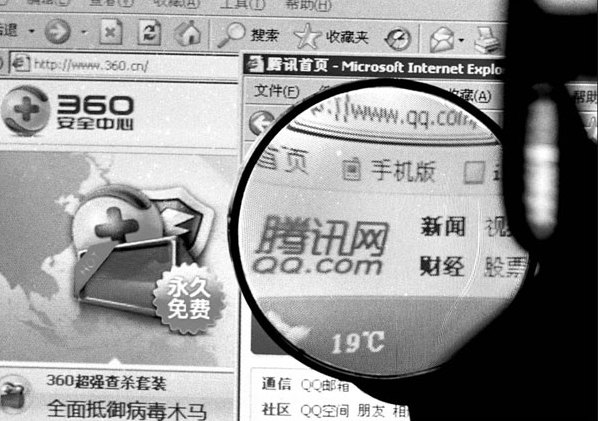Qihoo vs QQ: 'Monopoly' saga moves to high court
The Supreme People's Court began hearing an anti-monopoly dispute between two Chinese software giants on the Tuesday morning, the first of its kind since the country's anti-monopoly law took effect six years ago.
Whatever the final ruling, it will set a precedent as a landmark in the Chinese judicial field related to the Internet industry, said legal observers.
The case is part of a long-running conflict between Qihoo, developer of the 360 brand of antivirus software, and Tencent, creator of the instant messaging software QQ.
|
The dispute between software giants Qihoo and Tencent has moved from a battle on the PC desktop to the nation's highest court. Jing Wei / For China Daily |
The dispute dates back to 2010 when Tencent launched QQ Doctor - later known as QQ Housekeeper - a program similar to Qihoo's security software, which it bundled with its instant messaging service QQ.
Qihoo claimed Tencent infringed on user privacy with the QQ Doctor program and released its Koukou Bodyguard security software, which Tencent alleges can cause malfunctions in QQ.
As a result, millions of users were forced to take sides as Tencent announced that its QQ instant messaging service would shut down on computers with 360 antivirus software installed.
After mediation by the Ministry of Industry and Information Technology, the headline-grabbing saga appeared to be over as both companies issued letters of regret to the public and made their software compatible.
But the battlefield then moved from computers to the courts. Among a barrage of legal actions, Qihoo filed an anti-monopoly complaint with the Guangdong High Court.
In March, the provincial court ruled that Tencent does not have a dominant position in the market and dismissed Qihoo's claims. The anti-virus software company then lodged an appeal with the country highest court.
The key issue in the case is defining the market, said legal experts.
A broad definition of the market means less likelihood of a monopoly as defined by law, they noted.
The Guangdong High Court found Weibo - a Twitter-like micro blog - and other social media to be close substitutes for the QQ instant messaging service.
The court also ruled that the relevant market in the case is one with users worldwide rather than limited to the Chinese mainland.
"Transport costs, tariffs, user preference and government control are generally factored into defining a geographic market in an anti-monopoly case," Deng Zhisong, partner of Beijing Dacheng Law Office, told China Daily.
Zhang Xuejun, presiding judge of the Guangdong court, told People.com.cn in an earlier interview that the current laws are mainly designed to define traditional markets, so how to apply the law to the new, fast-growing Internet sphere requires innovation.
And the biggest innovation brought to the trial was use of the test for "small but significant and non-transitory increase in price" - known as the SSNIP test in the industry - to define a market in the Internet world.
According to the SSNIP theory, if a monopolist raises prices for a given period of time and consumers turn to substitutes, the substitutes and the product at issue are considered constituents of the same market, Zhang explained.
In the QQ case, the court held that if QQ is no longer free, users will select other free instant messaging services such as Weibo.
Beijing attorney Deng said that the use of the SSNIP model required a series of complete and accurate statistics.
"As QQ is free now, like many other online services and products, a slight rise in price means a fundamental change," he said, adding that in such a market, not only user attitudes but advertiser positions should also be considered.
"The supreme court's decision will offer a clear guideline on how to define a market in the face of an online model based on free services that attract advertisers with that user base," he said.
"The final ruling by the supreme court is sure to have a far-reaching effect in China's industries," said Deng, who has represented clients in international cases.
"I'm sure many of my foreign peers are also watching the case and will track its development."
Judge Zhang said "the Internet community should not become a place where the law of the jungle is applied".
Vicious competition without market order will ultimately harm interest of users, who are protected by the anti-monopoly law, he said.
"Dotcom companies are not merely responsible for earning their shareholders money," he said. "They shoulder more social responsibilities such as respecting intellectual property rights, running business as decent corporations and providing better services to users."
wangxin@chinadaily.com.cn



















